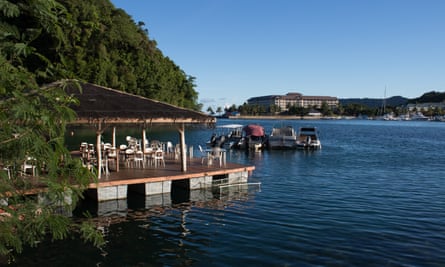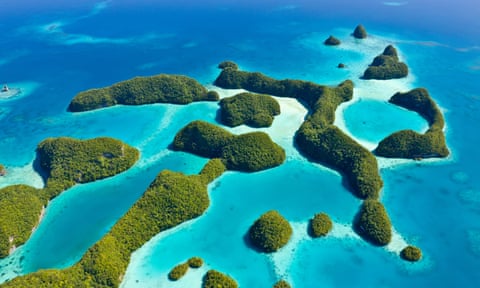Wearing a Hawaiian shirt and sipping an iced tea, Ongerung Kambes Kesolei sits at a veranda bar overlooking a hotel pool, under fans that slowly push humid air around on a quiet Sunday afternoon.
But the calm of the scene is deceptive, for Kesolei is explaining that his small island home of Palau – a dot on the map in the north-west corner of the Pacific with a population of just over 20,000 people – has attracted the ire of one of the world’s most powerful nations and is now at the centre of a geo-political bunfight.
“They [China] want to weaken Tsai Ing-wen [the Taiwanese president] and that’s where Palau comes into play,” said Kesolei, the editor of one of Palau’s two newspapers.
Palau is one of just 17 countries that has refused to give up diplomatic relations with Taiwan and switch allegiance to China.
Palau, which was under US administration until its independence in 1994, struck up diplomatic relations with Taiwan in 1999 after a few years of what Kesolei calls “wooing” from both Beijing and Taipei. The almost 20-year friendship has been strong, with Kesolei saying “every Palauan has a story” of interaction with Taiwan, whether travelling there for a holiday, education or medical treatment.
But Taiwan’s allies are slowly being chipped away, as China puts the pressure on and seeks to penalise those that recognise self-ruled Taiwan, which Beijing considers a Chinese territory. El Salvador switched its allegiance last month, and Burkina Faso and the Dominican Republic severed ties with Taiwan earlier this year.
Those countries that continue to recognise Taiwan – particularly the six Taiwanese allies located in the Pacific, where China is seeking to increase its influence – are feeling the pressure.
‘The governments are having a fight’
For tiny Palau, where tourism accounts for 42.3% of GDP, this pressure has come in the form of what the locals call the “China ban”.
In November 2017, the Chinese government ordered tour operators to stop selling package tours to Palau, with reports that doing so could lead to fines.
Some insist Palau has always been a blacklisted destination but that until recently the Chinese government turned a blind eye.

Evan Rees, Asia-Pacific analyst at Stratfor, says China uses such bans – as well as the granting and withholding of Approved Destination Status (ADS) to countries – as “part of a larger toolkit for compelling behaviour”.
Last year, South Korea was the subject of such a travel ban, after a row over its deployment of a US missile defence system, which had a devastating impact on tourism to the country during the PyeongChang Winter Olympics.
The bans affect package tours booked through travel agencies, which accounts for about 45% of all Chinese tourists, said Rees, though independent Chinese travellers are still able to visit “banned” destinations.
One Palauan-based Chinese businessman said the word “Palau” had also been blocked as an internet search term in China.
The impact of the ban on Palau has been stark.
The number of tourists from China has plummeted so dramatically that one airline flying charter flights between China and Palau stopped flights at the end of August, because “the Chinese government made Palau an illegal tour destination possibly and most likely due to lack of diplomatic status”.
Palauan tour operators and government officials bridle at suggestions the ban has brought Palau to its knees – there were still 9,000 visitor arrivals in July – but occupancy rates at hotels have dropped and businesses are hurting.
The pain of the ban has been particularly acute because it was immediately preceded by a staggering boom in tourism from China, with tourist arrivals from the country skyrocketing from 634 in 2008 – making up less than 1% of all visitors – to more than 91,000 in 2015 – 54% of all visitors.
At Elilai restuarant, which is heavily promoted as the “best restaurant in Palau” on billboards all over the island, I am the sole diner in a restaurant that could comfortably accommodate 50.
Waitress Donita Rose Cagaoan-Tipay is apologetic about the empty room, saying it was the result of a “ban from China”, though she says she doesn’t know much more about it than that.
“I asked my friend who is a Chinese tour guide, he said Palau and China, the governments are having a fight,” she explains.
The boom
The empty restaurants are a far cry from 2014 and 2015, when charter flights from China began landing every day each carrying hundreds of tourists.
Leilani Reklai says the impact on the island was overwhelming. “Guys were running around town buying land, getting cash in suitcases and buying everything in sight,” says Reklai, who is the president of Palau’s tourism association.

Reklai owned two boats that took tour groups to the Rock Islands, the most famous of Palau’s tourist attractions, which before the Chinese boom would go out four days a week during peak season.
“But for almost one year my guys were going out seven days a week” she says.
“Some people were saying ‘This is the Chinese strategy, this is what they do, they are going to pour a lot of money in here, and get you addicted like it’s Coke and then turn off the faucet’. But of course, money was louder so people weren’t listening,” says Reklai.
At 70, Francis Toribiong has had almost every job in the tourism business. He says the dip hurt “everybody”. Toribiong has been forced to sell a 25-bed hostel but says he got off relatively lightly.
“There are so many young men who went to the development bank and borrowed hundreds of thousands of dollars to buy boats,” he says. Now, demand has dropped so much that they are lucky if they are able to make enough to cover fuel and the loan repayments.

A blessing in disguise?
Despite the pain, most people agree the boom was unsustainable.
At its peak in 2015, 169,000 tourists arrived in Palau and the country’s power, water and sewage systems struggled to cope. There was huge inflation, and the price of food and rent skyrocketed.
“There was an outcry,” says Ngiraibelas Tmetuchl, chairman of the Palau Visitors Authority, the government’s tourism marketing arm. “Prices of crabs went up, prices of fish, rents went up, people were displaced. There was an apartment that was going for $500, now they charge $1,200. There was a shortage of rooms. Apartments [were converted] from apartments to hotels.”
Kevin Mesebeluu, director of the bureau of tourism, says the China ban may be “a blessing in disguise”, giving Palau a chance to reevaluate its approach to tourism.
“The president has been very clear about the direction,” he said. “High-value, low-impact sustainable tourism.”
Indeed, the country was heading down this path before the ban came into effect. In 2015, Palau’s president, Tommy Remengesau, announced a reduction in the number of charter flights between China and Palau, in response to environmental and social concerns.

Reklani thinks this decision, which came into effect gradually, means Palau escaped much more serious financial trouble. “We definitely got out in time, this pain we’re going through, it would have been so much worse,” she says.
Since the China ban, Remengesau has reiterated his commitment to Taiwan, telling the Nikkei Asian Review that while China was an “important partner” Palau had “more in common with Taiwan”.
A statement from his spokesperson was even more defiant, suggesting Palau would not bow to pressure: “Palau is a country of laws, it is a democracy and we make our own decisions.”
However, there are others who would not mind seeing Palau switch diplomatic horses.
“It’s about time that we focus our interests and views towards the People’s Republic of China,” said Senate president Hokkons Baules in July at the groundbreaking ceremony for a Chinese-backed resort, according to the Island Times.
The China-Taiwan question is expected to be a key issue at the next presidential election in 2020. But the Taiwanese ambassador to Palau, Wallace Chow, says he is not worried about the relationship, saying it is “very solid”.
Speaking to Guardian during an event for 25 Taiwanese youth ambassadors who are spending several days in Palau as part of a “soft power” mission, Chow says it is this “down-to-earth, to the people, for the people” approach that will keep Palau onside.

But Palauans may also be persuaded by the more than $10m in aid provided by Taiwan to the country each year, reminders of which are dotted around the island as signs announce that road or building projects are funded by Taiwanese grant money.
“I’m very confident that the Palauan people know who is their true partner and which side their bread is buttered,” said Chow.
Under the slowly moving fans, Kesolei says he does not expect a diplomatic switch anytime soon. “It’s part of our culture that we are very loyal to our friends,” he says.
Palauans also like the image of themselves as a country that is standing up to a superpower.
“Some of my social circle enjoy this limelight. Palau against China! This tiny thing against the world’s biggest [country]! Some of my friends say: if we have the power to decide, let’s be the last man standing with Taiwan, [other] countries will think we don’t just switch, we stay with our friends until the very end.”
